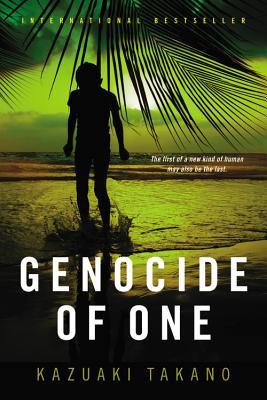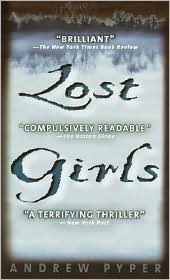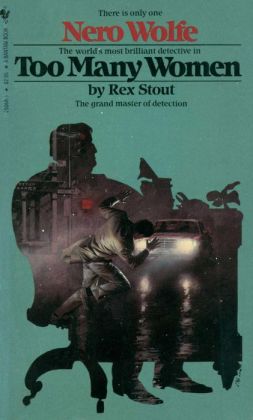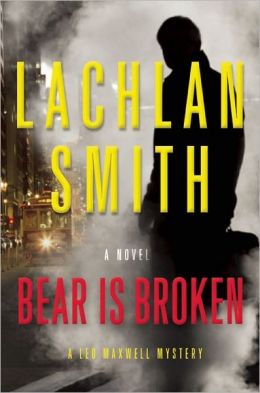
 Thanksgiving is almost upon us, and that means it's time to look at upcoming winter books. There's a lot to be thankful for, with books ranging from H. G. Adler's The Wall (translated from the German by Peter Filkins; Random House, December 2), a 720-page novel set during the Holocaust, to Angelina Mirabella's The Sweetheart (Simon & Schuster, January 20), a coming-of-age story set in the 1950s world of women's professional wrestling. While the focus of our Read Me Deadly previews is crime fiction, over the next few weeks we'll be showing you some other books that look good to us, as well. There's a feast of books waiting, so let's dig in!
Thanksgiving is almost upon us, and that means it's time to look at upcoming winter books. There's a lot to be thankful for, with books ranging from H. G. Adler's The Wall (translated from the German by Peter Filkins; Random House, December 2), a 720-page novel set during the Holocaust, to Angelina Mirabella's The Sweetheart (Simon & Schuster, January 20), a coming-of-age story set in the 1950s world of women's professional wrestling. While the focus of our Read Me Deadly previews is crime fiction, over the next few weeks we'll be showing you some other books that look good to us, as well. There's a feast of books waiting, so let's dig in! December 2nd can't come soon enough, because that's the date Mulholland is releasing a thriller early reviewers are raving about, Kazuaki Takano's Genocide of One (translated from the Japanese by Philip Gabriel). The one targeted for death in 2004 is a 3-year-old Kanga Pygmy named Akili living in the Congo, and the person ordering his elimination is U.S. President Gregory S. Burns (substituting for George W. Bush). Why does Burns think Akili needs to die? Burns has been informed a random mutation has made this kid so intellectually advanced, he's even now the smartest person on Earth. Akili threatens to make Homo sapiens extinct, much like we Homo sapiens wiped out the Neanderthals.
December 2nd can't come soon enough, because that's the date Mulholland is releasing a thriller early reviewers are raving about, Kazuaki Takano's Genocide of One (translated from the Japanese by Philip Gabriel). The one targeted for death in 2004 is a 3-year-old Kanga Pygmy named Akili living in the Congo, and the person ordering his elimination is U.S. President Gregory S. Burns (substituting for George W. Bush). Why does Burns think Akili needs to die? Burns has been informed a random mutation has made this kid so intellectually advanced, he's even now the smartest person on Earth. Akili threatens to make Homo sapiens extinct, much like we Homo sapiens wiped out the Neanderthals.This is already the basis for an exciting plot à la Tom Clancy, but Takano complicates it with an examination of culture, psychology, and current social issues, and he educates his reader about microbiological research. Playing a deadly game of chess are those Machiavellian connivers in Washington, DC, the Congo-bound band of private US military contractors clueless about the truth of their mission, a pharmaceutical researcher in Tokyo, and the uber-brainiac Akili, who may be able to put a spoke in President Burns's wheel. Yeah, sounds like a whole lotta fun to me.
 When I learned Jamie Mason has a new book due February 3rd, I scrambled to scribble the title on my list of books to read. Her first novel, last year's witty and macabre Three Graves Full (Gallery Books), was inspired by her love of Hitchcock and a headline, "Landscapers Find Skull in Mulch Bed." It features an accidental murderer named Jason Getty, whose nightmarish situation takes a decided turn for the worse when his landscaper unearths a corpse, and the police arrive and dig up another body, neither of whom is Jason's own personally buried victim.
When I learned Jamie Mason has a new book due February 3rd, I scrambled to scribble the title on my list of books to read. Her first novel, last year's witty and macabre Three Graves Full (Gallery Books), was inspired by her love of Hitchcock and a headline, "Landscapers Find Skull in Mulch Bed." It features an accidental murderer named Jason Getty, whose nightmarish situation takes a decided turn for the worse when his landscaper unearths a corpse, and the police arrive and dig up another body, neither of whom is Jason's own personally buried victim. Mason's upcoming Monday's Lie (Gallery Books) sounds very promising if you're a Coen brothers fan: Dee Aldrich begins to suspect her husband, Patrick, is not the man she thought he is and may be plotting a life without her. This is an unexpected worry, since Dee married her predictable college boyfriend after being raised by an unconventional mother, a CIA operative. Is Dee merely being paranoid? She turns to her late mother's advice and games of subterfuge they played in her childhood to get a handle on her unraveling marriage.
 All of us have our passions, whether it's World War II history or a quest to find the perfect-fitting pair of jeans. I'm interested in the nature of identity and enjoy fiction and nonfiction about amnesia, impersonation, misidentification as in Capgras delusion, twins, doubles, and doppelgängers. So I was thrilled to spot Andrew Pyper's The Damned (Simon & Schuster, February 10), about a pair of Detroit twins, one good and one evil. Good twin Danny Orchard is brought back to life after dying in the fire that killed his sociopathic twin, Ashleigh, on their 16th birthday. Danny has written a best-selling book about his near-death experience and met a nice woman, Willa, with a son, Eddie. Life would be dandy, but Ashleigh won't leave Danny alone.
All of us have our passions, whether it's World War II history or a quest to find the perfect-fitting pair of jeans. I'm interested in the nature of identity and enjoy fiction and nonfiction about amnesia, impersonation, misidentification as in Capgras delusion, twins, doubles, and doppelgängers. So I was thrilled to spot Andrew Pyper's The Damned (Simon & Schuster, February 10), about a pair of Detroit twins, one good and one evil. Good twin Danny Orchard is brought back to life after dying in the fire that killed his sociopathic twin, Ashleigh, on their 16th birthday. Danny has written a best-selling book about his near-death experience and met a nice woman, Willa, with a son, Eddie. Life would be dandy, but Ashleigh won't leave Danny alone.The Kirkus reviewer calls The Damned "memorable and, perhaps, nightmare-inducing." In other words, perfect when a fierce storm is wrestling with your house and you retreat to bed armed with a book, hot tea, and a shortbread cookie. Or two. Oh, heck, let's get real. Put the cookie tin on your nightstand. We can always add losing five pounds to our New Year's resolutions, and the awards-winning crime fiction of Canadian writer Pyper, a lawyer by training, is worth staying up until dawn to read. It's literary and sophisticated and often combines thrills with horror. His Lost Girls is a combo of mysterious disappearances and courtroom drama. In The Demonologist, scholar David Ullman, an authority on Milton's Paradise Lost, travels to Venice and encounters a demonic possession. The Trade Mission's pair of Canadian software developers and their party take a terrifying trip up Brazil's Rio Negro river.
 Okay, where are we? We have books in which a 3-year-old is pitted against a US president and his band of mercenaries; a wife uses CIA tactics to figure out her husband, who
may want to kill her; and an evil twin haunts her angelic brother. Now,
we come to an Appalachian morality tale/coming-of-age novel getting a lot of buzz because its publisher's sales reps and booksellers have fallen in love with it: Christopher Scotton's first novel, The Secret Wisdom of the Earth (Grand Central, January 6).
Okay, where are we? We have books in which a 3-year-old is pitted against a US president and his band of mercenaries; a wife uses CIA tactics to figure out her husband, who
may want to kill her; and an evil twin haunts her angelic brother. Now,
we come to an Appalachian morality tale/coming-of-age novel getting a lot of buzz because its publisher's sales reps and booksellers have fallen in love with it: Christopher Scotton's first novel, The Secret Wisdom of the Earth (Grand Central, January 6).In it, an adult narrator, Kevin, looks back to the summer of 1985, when he was 14. He and his mother, grieving the loss of his younger brother, go to stay with Kevin's grandfather, Pops, a widowed veterinarian, in the Kentucky coal town of Medgar. An energy company is devastating the land by utilizing "mountaintop removal" to mine coal; the environmentalist leader of its opposition is a popular gay hairstylist. Kevin tags around with Pops and becomes friends with Buzzy, who witnesses a murder. I predict fans of Ron Rash and Wiley Cash will want to read this one.
 All right, you tell me, how does one resist this next book? Emma and Otto and Russell and James (Simon & Schuster, January 20) is Canadian writer Emma Hooper's first. Early reviewers cite the beauty of the prose and the rich complexity of the characters. It's described as "a near homage" to The Pilgrim's Progress, John Bunyan's masterpiece of English literature recounting souls redeeming themselves through struggle, which hasn't been out of print since its publication in 1678.
All right, you tell me, how does one resist this next book? Emma and Otto and Russell and James (Simon & Schuster, January 20) is Canadian writer Emma Hooper's first. Early reviewers cite the beauty of the prose and the rich complexity of the characters. It's described as "a near homage" to The Pilgrim's Progress, John Bunyan's masterpiece of English literature recounting souls redeeming themselves through struggle, which hasn't been out of print since its publication in 1678.Hooper's strugglers were shaped by the Depression, and they survived World War II. Etta opens the book with a note to her beloved husband Otto: "Otto, I've gone. I've never seen the water, so I’ve gone there. Don't worry, I've left you the truck. I can walk. I will try to remember to come back. Yours (always), Etta"
Etta, now 82, is walking from Saskatchewan to Canada's east coast, because she's never seen the ocean. Along the way, she's joined by a talking coyote named James, courtesy of some magical realism. Writer Hooper travels back and forth through time as she weaves Etta's story together with those of Otto, who grew up on the Saskatchewan plains as one of 15 kids, and Russell, the boy who lived next door.
 With all the winter holidays coming, I'm on the lookout for a thriller to read on the plane or train. Sebastian Rotella's The Convert's Song (Mulholland, December 9) looks promising. Rotella is an award-winning investigative journalist and foreign correspondent, and his Valentine Pescatore is a former San Diego Border Patrol agent (Triple Crossing), who now works as a private eye in Argentina. In Buenos Aires, he runs into an old friend from Chicago, Raymond Mercer, an unsuccessful singer who has converted to Islam. After a terrorist attack kills hundreds at a local mall, police suspect Valentine and Raymond. Valentine's investigation takes him to Europe; along the way he is joined by French counterterrorism agent Fatima Belhaj and his ex-boss/ex-girlfriend Isabel Puente from San Diego.
With all the winter holidays coming, I'm on the lookout for a thriller to read on the plane or train. Sebastian Rotella's The Convert's Song (Mulholland, December 9) looks promising. Rotella is an award-winning investigative journalist and foreign correspondent, and his Valentine Pescatore is a former San Diego Border Patrol agent (Triple Crossing), who now works as a private eye in Argentina. In Buenos Aires, he runs into an old friend from Chicago, Raymond Mercer, an unsuccessful singer who has converted to Islam. After a terrorist attack kills hundreds at a local mall, police suspect Valentine and Raymond. Valentine's investigation takes him to Europe; along the way he is joined by French counterterrorism agent Fatima Belhaj and his ex-boss/ex-girlfriend Isabel Puente from San Diego.Word is that Rotella's book about geopolitical terror has a complex plot, colorful characters, and lashings of hard-boiled humor and musical references.
 I've been waiting for the English translation of the Franck Thilliez thriller Gataca for two years. Bred to Kill (translated from the French by Mark Polizzotti, Viking Adult) will be published on January 8th. This sequel to Syndrome E (see review here) is the fourth Franck Sharko/Lucie Henebelle series book, but only the second to be translated into English. It looks like a doozy.
I've been waiting for the English translation of the Franck Thilliez thriller Gataca for two years. Bred to Kill (translated from the French by Mark Polizzotti, Viking Adult) will be published on January 8th. This sequel to Syndrome E (see review here) is the fourth Franck Sharko/Lucie Henebelle series book, but only the second to be translated into English. It looks like a doozy.Reeling from the events at the end of Syndrome E, Paris homicide inspector Sharko and former Lille detective Henebelle investigate the murder of grad student Eva Louts, who was involved in human genome research that's tied to the theft of a Cro-Magnon mummy and the existence of a tribe in the Brazilian jungle. Her death is also linked to a tragedy dogging Henebelle.
Intriguing science (paleontology this time) and sleuths unique in their personal vulnerabilities combine to make these French thrillers exciting reads. One cares about Sharko and Henebelle. I'd like another Thilliez translation next Christmas.
I hope I've whetted your appetite for more winter books, because tomorrow Maltese Condor will bring in the second course.







